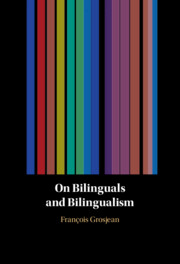Book contents
- On Bilinguals and Bilingualism
- On Bilinguals and Bilingualism
- Copyright page
- Dedication
- Contents
- Figures
- Tables
- Introduction
- 1 The Setting
- 2 A Holistic View of Bilingualism
- 3 The Bilingual’s Language Modes
- 4 The Complementarity Principle
- 5 Spoken Language Processing
- 6 Cross-linguistic Influence
- 7 Bilinguals Who Are Also Bicultural
- 8 The Bilingualism and Biculturalism of the Deaf
- 9 The Statistics of Bilingualism
- 10 Special Bilinguals
- 11 A Bilingualism Researcher’s Social Role
- Appendix The Right of the Deaf Child to Grow Up Bilingual
- References
- Index
4 - The Complementarity Principle
Published online by Cambridge University Press: 08 February 2024
- On Bilinguals and Bilingualism
- On Bilinguals and Bilingualism
- Copyright page
- Dedication
- Contents
- Figures
- Tables
- Introduction
- 1 The Setting
- 2 A Holistic View of Bilingualism
- 3 The Bilingual’s Language Modes
- 4 The Complementarity Principle
- 5 Spoken Language Processing
- 6 Cross-linguistic Influence
- 7 Bilinguals Who Are Also Bicultural
- 8 The Bilingualism and Biculturalism of the Deaf
- 9 The Statistics of Bilingualism
- 10 Special Bilinguals
- 11 A Bilingualism Researcher’s Social Role
- Appendix The Right of the Deaf Child to Grow Up Bilingual
- References
- Index
Summary
The author’s Complementarity Principle states that bilinguals usually acquire and use their languages for different purposes, in different domains of life, with different people. Different aspects of life require different languages. The author first evokes the contribution of past research on his thinking about the topic. For instance, early sociolinguistic studies of bilingual communities put heavy emphasis on the functions of languages. He then concentrates on the principle itself as it slowly came into focus in his work. He defines it, presents it in a diagram, and discusses its impact on language proficiency, dominance, and translation abilities in bilinguals. This is followed by a description of studies undertaken in his laboratory that found evidence for it, as well as his search for studies in production, perception, and language acquisition that confirmed its importance. The author then discusses the coming of age of the principle reflected in the reactions of researchers in the field, and the various studies, mostly experimental and descriptive, they have conducted to examine it. The principle is one of the most pervasive aspects of individual bilingualism, and it is invariably present in bilingual psycholinguistic research as an independent, control, or confounding variable.
Keywords
- Type
- Chapter
- Information
- On Bilinguals and Bilingualism , pp. 59 - 75Publisher: Cambridge University PressPrint publication year: 2024

